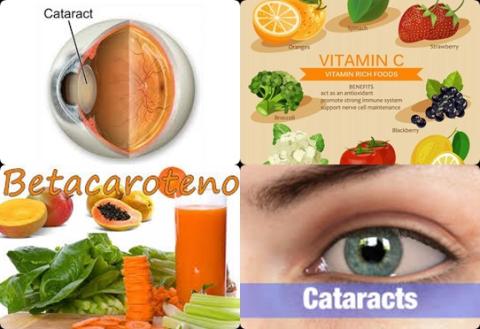
Objectives:
Existing studies suggest that dietary vitamins and carotenoids might be associated with a reduced risk of age-related cataract (ARC), although a quantitative summary of these associations is lacking. Therefore, this review article has been conducted.
Do vitamins and carotenoids intake reduce risk of the eye disease age-related cataract?
Study design:
This review article included 8 RCTs and 12 cohort studies.
Results and conclusions:
The investigators found in cohort studies a significantly reduced risk of 19% [RR = 0.81, 95% CI = 0.71 to 0.92, p = 0.001] of age-related cataract for dietary vitamin A intake.
The investigators found in cohort studies a significantly reduced risk of 20% [RR = 0.80, 95% CI = 0.72 to 0.88, p 0.001] of age-related cataract for dietary vitamin C intake.
The investigators found in cohort studies a significantly reduced risk of 10% [RR = 0.90, 95% CI = 0.80 to 1.00, p 0.049] of age-related cataract for dietary vitamin E intake.
The investigators found in cohort studies a significantly reduced risk of 10% [RR = 0.90, 95% CI = 0.83 to 0.99, p = 0.023] of age-related cataract for dietary β-carotene intake.
The investigators found in cohort studies a significantly reduced risk of 19% [RR = 0.81, 95% CI = 0.75 to 0.89, p 0.001] of age-related cataract for dietary β lutein or zeaxanthin intake.
The investigators found in RCTs compared with the placebo, a non-significantly reduced risk of 3% [RR = 0.97, 95% CI = 0.91 to 1.03, p 0.262] of age-related cataract for vitamin E supplementation.
Non-significantly because RR of 1 was found in the 95% CI of 0.91 to 1.03. RR of 1 means no risk/association.
The investigators found in RCTs compared with the placebo, a non-significantly reduced risk of 1% [RR = 0.99, 95% CI = 0.92 to 1.07, p 0.820] of age-related cataract for β-carotene supplementation.
The investigators found in dose-response analysis of cohort studies a significantly reduced risk of 26% [RR = 0.74, 95% CI = 0.67 to 0.80, p 0.001] of age-related cataract for every 10-mg/d increase in dietary lutein or zeaxanthin intake.
The investigators found in dose-response analysis of cohort studies a significantly reduced risk of 18% [RR = 0.82, 95% CI = 0.74 to 0.91, p 0.001] of age-related cataract for every 500-mg/d increase in dietary vitamin C intake.
The investigators found in dose-response analysis of cohort studies a significantly reduced risk of 8% [RR = 0.92, 95% CI = 0.88 to 0.96, p 0.001] of age-related cataract for every 5-mg/d increase in dietary β-carotene intake.
The investigators found in dose-response analysis of cohort studies a significantly reduced risk of 6% [RR = 0.94, 95% CI = 0.90 to 0.98, p 0.001] of age-related cataract for every 5 mg/d increase in dietary vitamin A intake.
The investigators concluded dietary intake of vitamin A (at least 5 mg per day), vitamin C (at least 500 mg per day), vitamin E, β-carotene (at least 5 mg per day) and lutein or zeaxanthin intake (at least 10 mg per day) reduce risk of age-related cataract.
Original title:
Dietary vitamin and carotenoid intake and risk of age-related cataract by Jiang H, Yin Y, […], Ma L.
Link:
https://www.ncbi.nlm.nih.gov/pubmed/30624584
Additional information of El Mondo:
Find more information/studies on of vitamin A, vitamin C, vitamin E, β-carotene and elderly right here.